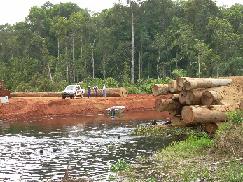Report urges forestry industry to tackle conflict with local people
Conflict between companies that profit from forests and local people who depend on them could be tackled by industry-led approaches but too few companies use them, says a report published today (8 July) by The Forests Dialogue (TFD), an international group of forest experts from business, environmental, academic and human rights groups.

Photo: Marcelin AGNAGNA
The report, written for TFD by the International Institute for Environment and Development (IIED), urges companies to take the lead in resolving existing conflicts and preventing new ones from arising.
Conflict in the forest sector is common and can range from wars of words to serious acts of violence. It most often follows disputes over rights to land and resources but can also arise over conservation priorities, pollution, and access to benefits from the sector. Conflict is a lose-lose situation. For local communities it means diminished livelihoods and worse, and for the private sector it increases costs and risks.
"Most companies in the forest sector have no formal systems to address conflict, despite there being clear ethical and business cases for doing so,” says Emma Wilson, a senior researcher at IIED and author of the report. “Forest certification schemes often require companies to have systems for local stakeholders to raise grievances, but very few companies are certified and those that are tend to have systems that are ad hoc or in their early pilot stages.”
The report shows that while company-led approaches for avoiding and managing conflict in the forest sector do exist, they are rarely used to their full potential. It calls for a range of mechanisms and flexible, locally tailored approaches to address conflicts.
"This report draws on established best practice to show how companies can take the lead in resolving conflicts and pursuing fair and equitable outcomes,” says TFD co-leader Stewart Maginnis, of International Union for the Conservation of Nature. “It shows that even where national legislation to protect poor people’s rights is woefully inadequate, private sector relations with local communities do not have to be held hostage to the lowest common denominator but can live up fully to the aspirations of good corporate social responsibility.”
The report calls for more industry-wide sharing of experience and knowledge, and the development of broadly applicable means of resolving conflicts.
"Sustainable companies invest for the long term, so they have a broader perspective than the average company on who their major stakeholders are and a deeper interest in understanding and accommodating local expectations and concerns,” says TFD co-leader James Griffiths, who heads the sustainable forestry programme at the World Business Council for Sustainable Development (WBCSD). “This report – which features several WBCSD member companies - can help share best practice within the sector, while clarifying the respective roles of companies and other stakeholders, like government, in address existing conflicts or avoiding future ones.”
The report acknowledges that companies will not be able to do this alone. It urges companies to build effective, equitable and lasting relationships with groups that are directly affected by forestry operations – including indigenous peoples, forest owners and user groups, unions, other businesses, civil society organisations, community leaders and government – in order to address environmental and social concerns. To be effective, companies also need supportive local policies and laws. The report highlights the potential for good practice in company-led approaches to influence the local policy environment through demonstration.
“Enduring conflicts between forest peoples and forestry companies have been one of the main barriers to good relations between corporations and communities,” says Marcus Colchester, Director of the Forest Peoples Programme, a human rights group.
“As this report stresses, conflicts may be rooted in the lack of recognition of customary rights in national laws and policies but such conflicts can be resolved by companies going the extra mile. Better though if governments provide a fairer basis in the first place.”
The report notes that some conflicts can only partially be addressed by voluntary corporate approaches, especially if they are deeply rooted in historical land use and land reform processes. Such conflicts may be addressed most effectively through reform of policy and the practices of governments and bureaucracies.
TFD members are drawn from organisations such as the International Tropical Timber Organization, World Bank, International Institute for Environment and Development, World Business Council for Sustainable Development, International Union for the Conservation of Nature, Forest Peoples Programme and International Alliance of Indigenous and Tribal Peoples of the Tropical Forests.
Members of TFD participate as individuals, not organisational delegates.
To request an embargoed copy of the report, email: mike.shanahan@iied.org
For interviews, contact:
Gary Dunning
Executive Director
The Forests Dialogue
Yale University
gary.dunning@yale.edu
Tel: +12034325966
Emma Wilson
Senior Researcher
International Institute for Environment and Development
emma.wilson@iied.org
Tel: 44 207 388 2117
Stewart Maginnis
Director, Environment and Development
IUCN
Tel: +41 794771205
James Griffiths
Managing Director: Ecosystems, Water and Sustainable Forest Products Industry
World Business Council for Sustainable Development (WBCSD)
griffiths@wbcsd.org
T: +41 (0) 22 839 31 14



